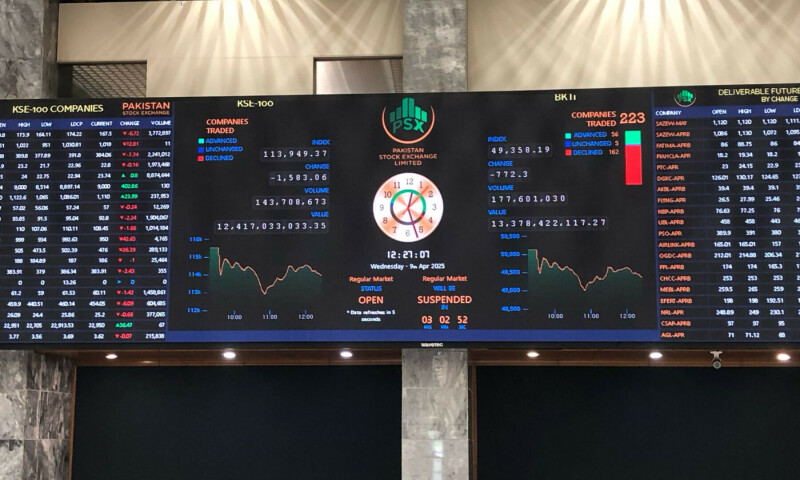The Pakistan Stock Exchange (PSX) declined by over 1,300 points on Wednesday, a day after the index posted a mild recovery following global market turmoil in response to fears that the trade war between the United States and China would escalate.
The benchmark KSE-100 index plunged by 2,640.95 points, or 2.29 per cent, to reach at 112,891.48 at 10:49am from the previous close of 115,532.43. By 2:56pm it recovered to 114,370.23, or 1.01pc below the last close.
Finally, the index declined by 1,379.28 points, or 1.19pc, to close at 114,153.15.
The decline comes as additional US tariffs on Chinese imports reached 104pc today, as Washington doubles down on planned action after Beijing vowed a “fight to the end” on levies.
Awais Ashraf, research director at AKD Securities, pointed out that the hike in US tariffs on China to 104pc has “heightened recession risks due to a slowdown in global growth, dampening investor sentiment at the PSX”.
“However, lower commodity prices — especially oil — and a potential competitive advantage from the new tariffs could positively impact our external account,” Ashraf noted.
Yousuf M. Farooq, research director at Chase Securities, noted that the local stock exchange was down today “in line with global markets”.
“A decline in oil prices this morning has led to weakness in oil-related stocks. However, we believe the drop in oil prices will more than offset any downside risks to exports,” he said.
“The market is currently down 5.5pc from its all-time high. That said, Pakistan’s equity market has remained relatively resilient, as exports constitute a small portion of GDP,” Farooq said.
He added that historical data from the 2008 financial crisis and the Covid-19 pandemic shows that remittances remained stable during those periods, which bodes well for external account stability.
Farooq pointed out: “India announced an interest rate cut this morning, and with inflation expectations in Pakistan now significantly lower — driven by the global decline in commodity prices — we could potentially see a rate cut locally as well.”
He observed that lower oil prices also provide the government with fiscal space to raise revenues through a higher petroleum development levy (PDL) if necessary.
Today’s fall in PSX follows Monday’s bloodbath at the PSX when shares plunged by 3,882 points amid rising fears of a global recession and retaliation from the United States’ major trade partners and China.
That day, the KSE-100 index witnessed a record intra-day plunge (points-wise) of 8,687.68 points, before partially recouping some losses on late value-hunting, following a mid-session trading halt.
Yesterday, Ali Najib, head of sales at Insight Securities, emphasised the need for observing market behaviour after April 9, when the global trade tariffs will be implemented, and assessing their repercussions on the affected countries.
He said the reciprocal tariffs might trigger market volatility, with investor sentiment turning cautious, adding that export-driven stocks could decline while safe-haven assets like gold might gain.
Trade tensions with countries having huge trading volumes could spark retaliation, affecting global supply chains and earnings outlooks, potentially leading to a short-term market pullback.


